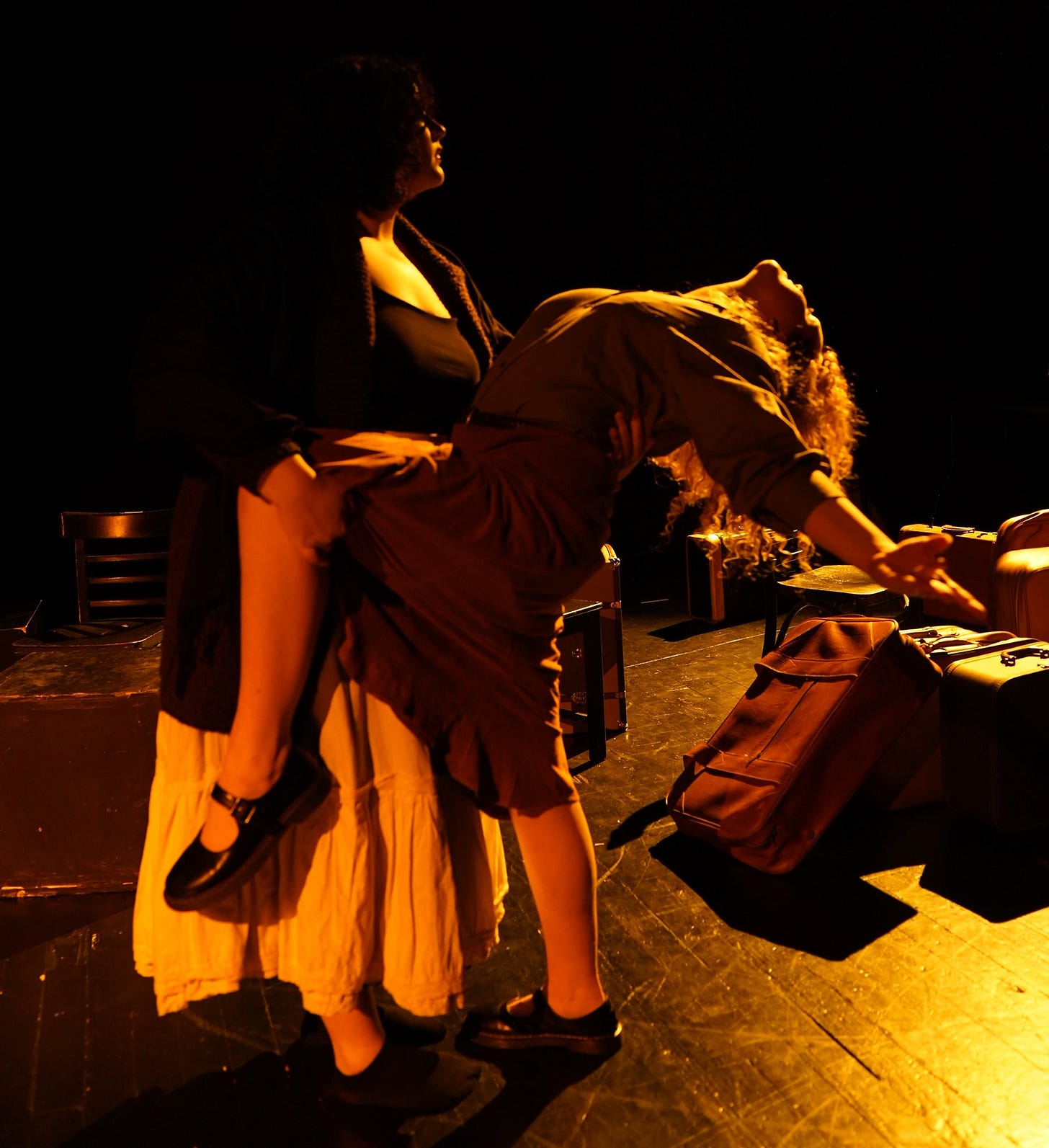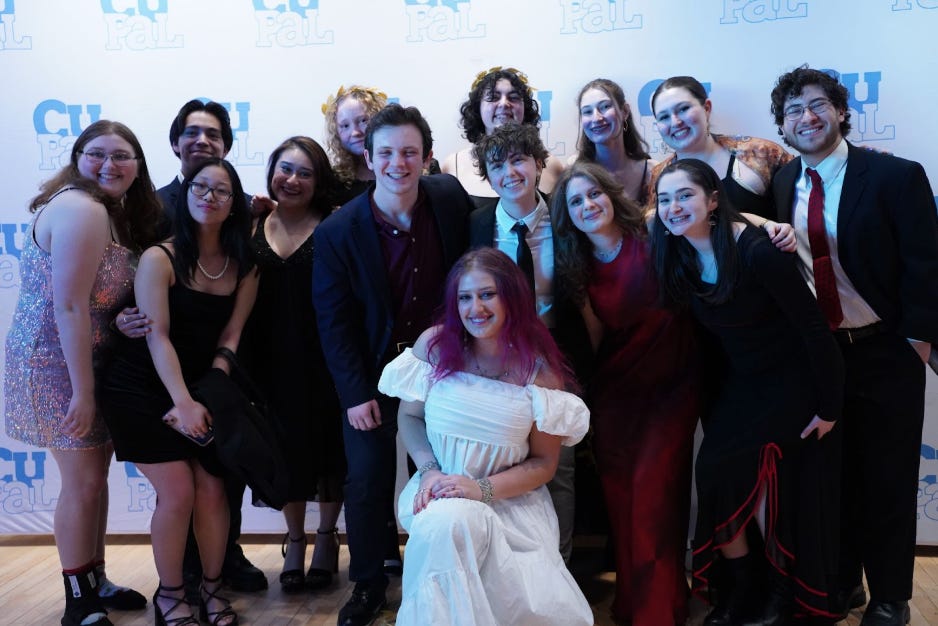Review: Indecent, a Play Within a Play Within a Play, Is a Story for Our Times
What the Columbia Players’ production can teach us about self-censorship, resilience, and community
As I walked into the Black Box Theatre in Lerner Hall on March 30, I felt that I had somehow traveled back in time. Actors in provincial 1900s garb walked around onstage, in character before the show officially began. I felt as if the whole room was holding its breath, waiting for some explosion to rock the actors back to life.
Unlike most plays, where characters are gradually introduced, Indecent, performed by the Columbia University Players, began with the actors already visible. It was clear that this play would subvert the conventions of typical theater productions. A projector lit up the wall opposite the audience:
אויסגעלאַסן
INDECENT
the true story of a little Jewish play
Paula Vogel’s Indecent recounts the dramatized narrative of God of Vengeance, a 1906 play by Sholem Asch, a Polish-Jewish writer and pioneer of Yiddish theater. God of Vengeance was controversial for its portrayal of prostitution, homosexuality, and religious irreverence. During its Broadway run in 1923, the producer and cast were arrested for obscenity.
Indecent experiments with cast and the form of storytelling to an extent I had never seen before. Bear with me here: The students are playing actors of a theater troupe. The actors of that theater troupe are putting on a production. That production retells the journey of another production: God of Vengeance. The troupe members each portray a character involved in the production of God of Vengeance at a specific stage of life—the “Ingenue” (the naive), the “Middle,” or the “Elder.” As the characters in the retelling of God of Vengeance become disillusioned with the world, the troupe cycles through the stages. When the characters switch stages of life, they are played by a different actor in the troupe.
For example, Asch is first portrayed by the troupe member Avram during his “Ingenue” stage (Jamie Treatman-Clark CC ’27). Later, he metamorphosizes into the “Elder” stage and is instead played by troupe member Otto (Cooper John Antczak CC ’28) as he gives up on the dreams and ideals of his youth.
Indecent is a series of stories nested within themselves. First, there is the reenactment of scenes from God of Vengeance, which added context and color to the “main” plot. Second, this “main” plot covers the journey of God of Vengeance through the hands of its various keepers. Third, the troupe’s reenactment of God of Vengeance occurs in the context of rising global antisemitism and xenophobia; they eventually find themselves in the Łódź Ghetto in Warsaw, Poland, resolutely performing even as the horrors of the Holocaust creep up on them.
In my conversation with the director, Abigail Fixel BC ’26, I jokingly suggested that the play was “an onion.” Fixel replied, “that’s literally what I said every rehearsal. It’s meta-theatricality at its max.”
In her director's note, Fixel wrote about the exigency of putting on Indecent at this particular moment in time. “Today we face a historic rise in antisemitism, censorship, homophobia, and transphobia,” Fixel wrote. “The threats faced by the troupe are not distant echoes of the past; they are unfolding now, and we’ve carried that weight with us into the rehearsal room.”
For example, Indecent’s recounting of the censorship that plagued God of Vengeance throughout its lifespan is reminiscent of debates over free speech today. And, as the troupe faced Nazi persecution in the Łódź Ghetto, one line in particular stood out to me: “They’re taking away our visas.”
I spoke with Maya Madajewicz CC ’28, who played Chana (who plays characters in the “Ingenue” stage), about the resonance of Indecent in our current moment. She recalled a scene in which Asch expressed anxiety that the horrors of the Holocaust might come to the U.S.:
SHOLEM ASCH: It’s coming here.
MADJE (Sholem’s wife): No, it’s not coming here. We are safe here.
“We really think that we’re so different and we’re so safe from everything around us,” Madajewicz said. "But there are so many parallels you can see in today’s climate, with people getting deported, and people getting their rights taken away, and getting silenced, and education getting defunded.”
Fixel said that the company “wanted people from all sides of the political spectrum to see this show and resonate with it” and to “show us that we’re all a little more similar than we might think.”
“I think the beauty of this show is that the way you resonated with the production could have been completely different from the person sitting next to you,” she added.
The production of Indecent practices the inclusion that it preaches. According to the program, it is the “first Shomer-Shabbos-inclusive production at Columbia in recent history.” Often, Jewish students have to choose between their passion for theater and their religious observances. “In my time at Columbia, there has been no production on this campus that does not have shows on Friday night and Saturday day, and so observing Jewish students haven’t been able to be a part of it,” Fixel said.
Just as the theater community has often excluded observant Jewish students, Indecent is also a commentary on exclusion and self-censorship. A central conflict of the play is Orthodox Jewish papers denouncing Asch’s play as “obscene” and “indecent” fearing that it would spark antisemitic sentiment due to its portrayal of flawed Jewish characters.
This fracture reminded me of the current debates within the Jewish community about the Israel-Palestine conflict. Sometimes Jewish students who support Palestine are labeled as “antisemitic” for their criticisms of Israel, a Jewish state, often by Zionist Jews. But who gets to define what’s obscene, unspeakable, or indecent, excluding members of their own community in the process?
Indecent asks a lot of questions, but doesn’t provide many answers. Jamie Treatman-Clark (who was the production’s dramaturg in addition to playing Avram) described it to me as “Brechtian.” Treatman-Clark is referring to the German playwright Bertolt Brecht’s meta-theatrical theory of Verfremdungseffekt, or the estrangement effect. This theory claims that theater should be analyzed from a critical angle and can be achieved by slowly breaking down the theatrical veil between the production and the audience (commonly known as the fourth wall) so that the inner workings of the show are made entirely visible to the audience. Indecent does this through the use of placards that denote shifts in action, choreographed transitions, and having actors directly address their pleas for aid to the audience.
This genre of theater is inherently opposed to providing the audience with easy answers. The way the actors and cast transition amongst themselves onstage prevents the audience from becoming too emotionally attached to any single character, but can encourage viewers to examine the themes of the play critically. As a result, the messaging of the play comes across as oblique—and, at times, self-contradictory.
One of the central weaknesses of Indecent is its own self-censorship. In writing the play and cherry-picking certain scenes from God of Vengeance to include, Vogel is, by definition, excluding others. The most notable exclusion is the scene from God of Vengeance in which one of the characters throws the Torah to the ground. Indecent holds its breath, pausing the scene with a still shot of the character holding the Torah above his head: The act of sacrilege never occurs.
Of course, there are plenty of defensible reasons for excluding this particular act. For one, the actors were uncomfortable doing it: “We can’t put it on the ground,” Fixel said. “It’s the Torah.”
Yet, Indecent is okay with other “blasphemous” acts. The script of God of Vengeance—which is the stage manager’s “lifeblood,” Fixel said—is thrown on the ground twice during the play. “He lives and dies for that play,” Fixel continued. “And so we can throw that script? And at the same time, people lived and died for the Torah, but we don’t throw that.”
Despite the well-reasoned exclusion of this pivotal scene, the result is still self-censorship. In avoiding its titular “indecency,” the play seemed to undermine its own message. After all, Asch himself did not shy away from the profane, the blasphemous, and the transgressive: As a play about his legacy, neither should Indecent.
Yet, for all its faults, at its core, Indecent is a scrappy reaffirmation of resilience and the importance of self-expression. These messages are especially poignant in our contemporary society, which is rife with social conflict and political censorship.
Indecent, in my view, is an archeological play. It examines how the past was shaped by the culture of the time, and how, in turn, that culture shapes us today. It exhumes the dead, not as an act of sacrilege, but of power—they are given the agency to tell their own story. As I watched the play, this cycle of death and rebirth reminds me of how T.S. Eliot writes about life’s eternal resilience in his poem “The Wasteland”:
April is the cruellest month, breeding
Lilacs out of the dead land, mixing
Memory and desire, stirring
Dull roots with spring rain.
Winter kept us warm, covering
Earth in forgetful snow, feeding
A little life with dried tubers.
Even during troubling times, hope persists; the troupe, even after they are executed in the Łódź Ghetto, returns to the stage as spirits to tell their story. Every production of God of Vengeance begins with the actors spilling ash from their pockets—after this acknowledgement of their indescribable loss, the play starts anew. To paraphrase: After all, it is April, and soon the lilacs will bloom.
Ms. Chen is a first-year at Columbia College studying linguistics, cognitive science, and East Asian languages & cultures.








Free Free 116 Street!
🇺🇸❤️🇵🇸